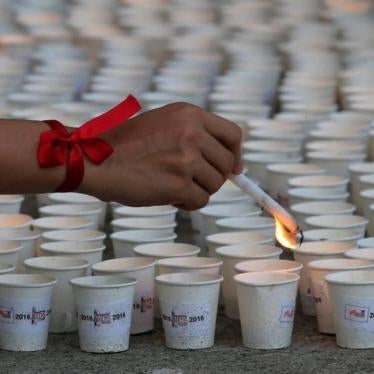If government censors get their way at next week's United Nations conference on HIV/AIDS, the denial and discrimination that have helped spread the disease will continue unabated.
Several government delegations, including those of the United States, Egypt, Libya, and the Vatican, are attempting to delete from the draft declaration of the U.N. General Assembly Special Session on HIV/AIDS any mention of that groups at particularly high risk of HIV infection are men having sex with men, sex workers and their clients, and injecting drug users and their sex partners.
"Moral squeamishness shouldn't stand in the way of finding solutions to this terrible crisis," said Kenneth Roth, executive director of Human Rights Watch. "At a conference devoted to fighting AIDS, governments must not replicate the silence and denial that have driven the spread of the disease."
In language agreed to by Canada, Australia, and several Latin American and European countries, the draft declaration makes explicit the goal of reducing incidence among "men who have sex with men, sex workers, [and] injecting drug users and their sexual partners," as well as prisoners and refugees. The United States proposes striking this list and replacing it with the vague and anodyne phrase, "vulnerable individuals," including those engaging in "risky sexual behavior." The Vatican prefers a similarly euphemistic reference to "people who have multiple sex partners." Egypt suggests substituting the judgmental phrase, "homosexuality among men, prostitution, and other forms of irresponsible sexual behavior."
"HIV/AIDS is born in large part of discrimination against women, gay men, drug users, sex workers, and others whose status has impeded their access to services, information, and social support," said Joanne Csete, a public health expert on AIDS at Human Rights Watch. "Pretending that these groups don't exist, or reinforcing discrimination against them, will only accelerate the spread of the epidemic by pushing them further underground and out of reach of the services they desperately need to contain the disease."
Csete is the author of a report on violations of the rights of AIDS orphans in Kenya, to be released next week.
Violation of civil and political rights is the engine that spreads HIV/AIDS in many parts of the world. Where women are unable to negotiate the terms of their sexual relations, where gay men and sex workers are marginalized and excluded from services, and where sexual violence is prevalent, HIV/AIDS flourishes. In negotiations earlier this month, the United States nonetheless rejected a proposal by the European Union and the Rio Group that the declaration adopt a "rights-based approach" to combating HIV/AIDS.
"If governments attempt to fight HIV/AIDS without addressing the rights violations that fuel the epidemic and result from it, they will be doing only half the job—or less," said Csete.
The draft declaration of the AIDS conference was meant to be completed in preparatory meetings ending May 25 at which civil society organizations were present. However, since then, discussions have continued over contentious points in closed-door sessions attended only by governments.
"The independent voices most likely to highlight the role of human rights abuse in the spread of HIV/AIDS have been excluded from these deliberations," said Roth. "Sadly, governments seem determined to shut out uncomfortable messages, even at the risk of a less effective strategy for fighting this deadly disease."






